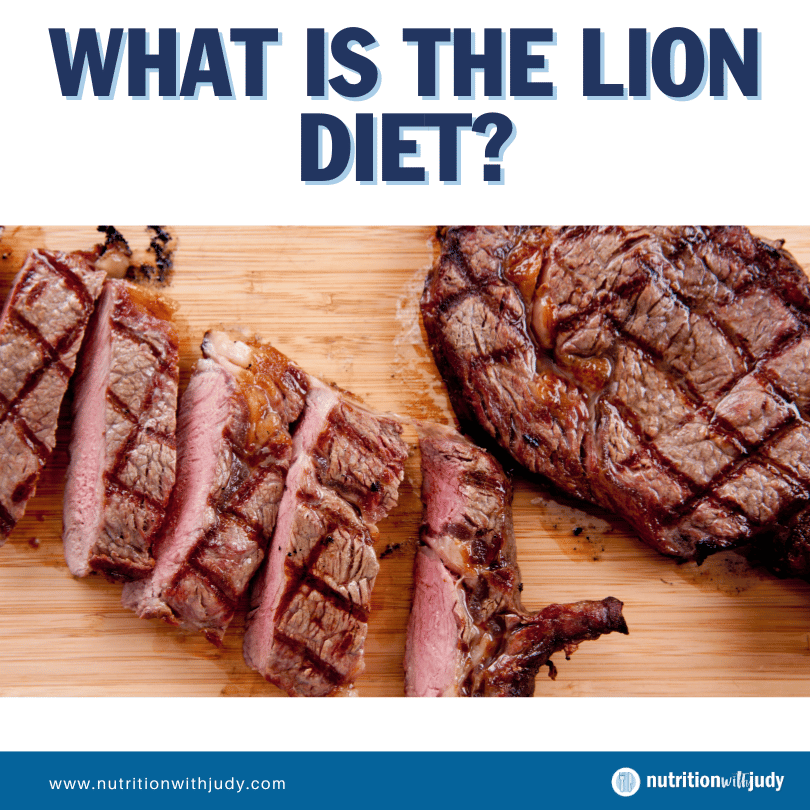

What Is the Lion Diet?


As World Carnivore Month concluded in January, many individuals find themselves embarking on their carnivore diet journeys, with some needing to start with the lion diet. This highly specialized diet, often seen as an extension of the carnivore diet, focuses exclusively on ruminant meats, salt, and water.
This approach is especially beneficial for those seeking to eliminate potential dietary triggers and improve their overall health through a simplified, meat-centric diet. The lion diet’s emphasis on ruminant meats such as beef, lamb, and goat, provides essential nutrients while minimizing the intake of potential irritants found in other foods.
Due to our clinical practice, we recognize the unique benefits of this diet for certain individuals, particularly those with sensitive systems or specific health challenges. Our goal is to guide and support you through this dietary transition, ensuring a positive and health-focused experience.
What Is the Carnivore Diet?
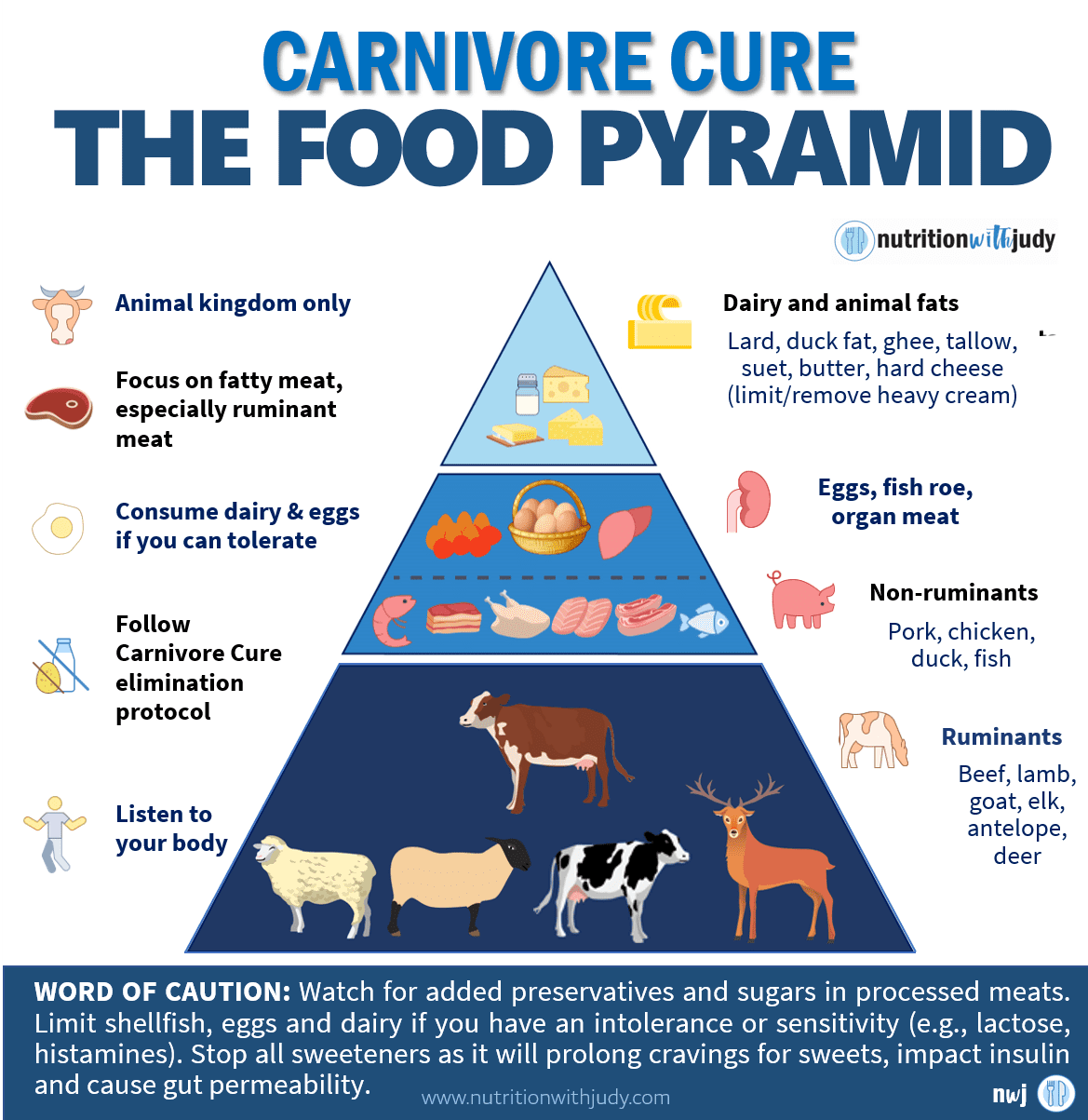

The carnivore diet is a dietary approach that focuses exclusively on animal products. It’s a zero-carb, all-meat diet that includes meat and can also include fish, eggs, and dairy products. There are many different variations of this diet, each with different dietary inclusions. This diet eliminates all other food groups, including fruits, vegetables, grains, nuts, and seeds. The carnivore diet is also seen as an elimination diet, helping individuals identify food intolerances.
What Are the Benefits of the Carnivore Diet?
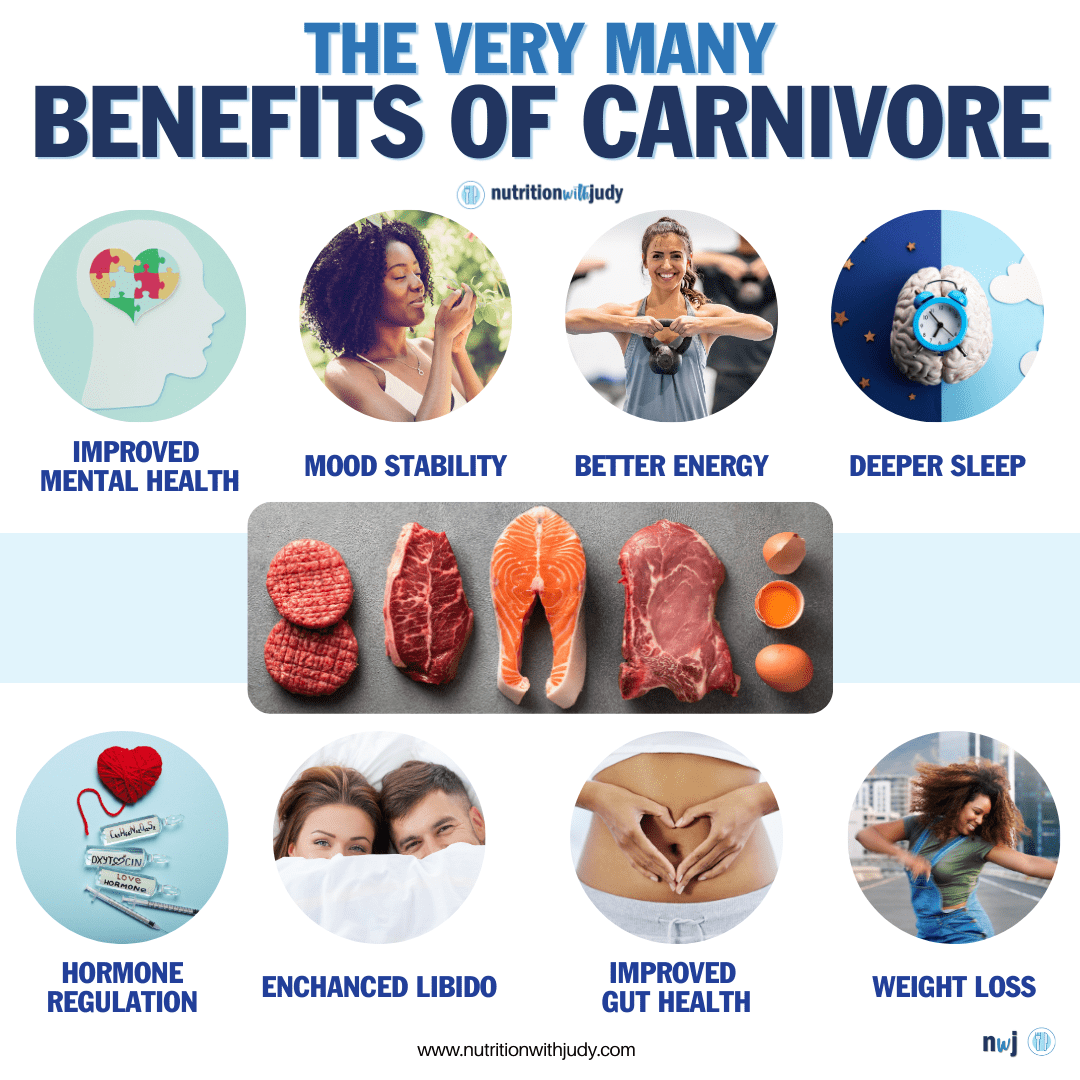

The carnivore diet, a regimen centering solely on animal products, offers a plethora of benefits, making it an appealing choice for individuals seeking various health improvements. Here’s a comprehensive overview of its advantages:
- Simplified Eating and Digestive Relief: The carnivore diet is celebrated for its gut-healing properties and ability to support various gastrointestinal (GI) conditions. Many followers report relief from bloating, IBS, and other gut-related problems.
- Weight Management: A natural reduction in calorie intake often occurs due to the high satiety levels of protein and fat, aiding in weight loss or maintenance without the need for calorie counting.
- Mental Health Benefits: Anecdotal evidence and scientific studies suggest improvements in mood and mental clarity. Some individuals have reported alleviation of depression and anxiety symptoms, possibly due to stabilized blood sugar levels and elimination of dietary triggers.
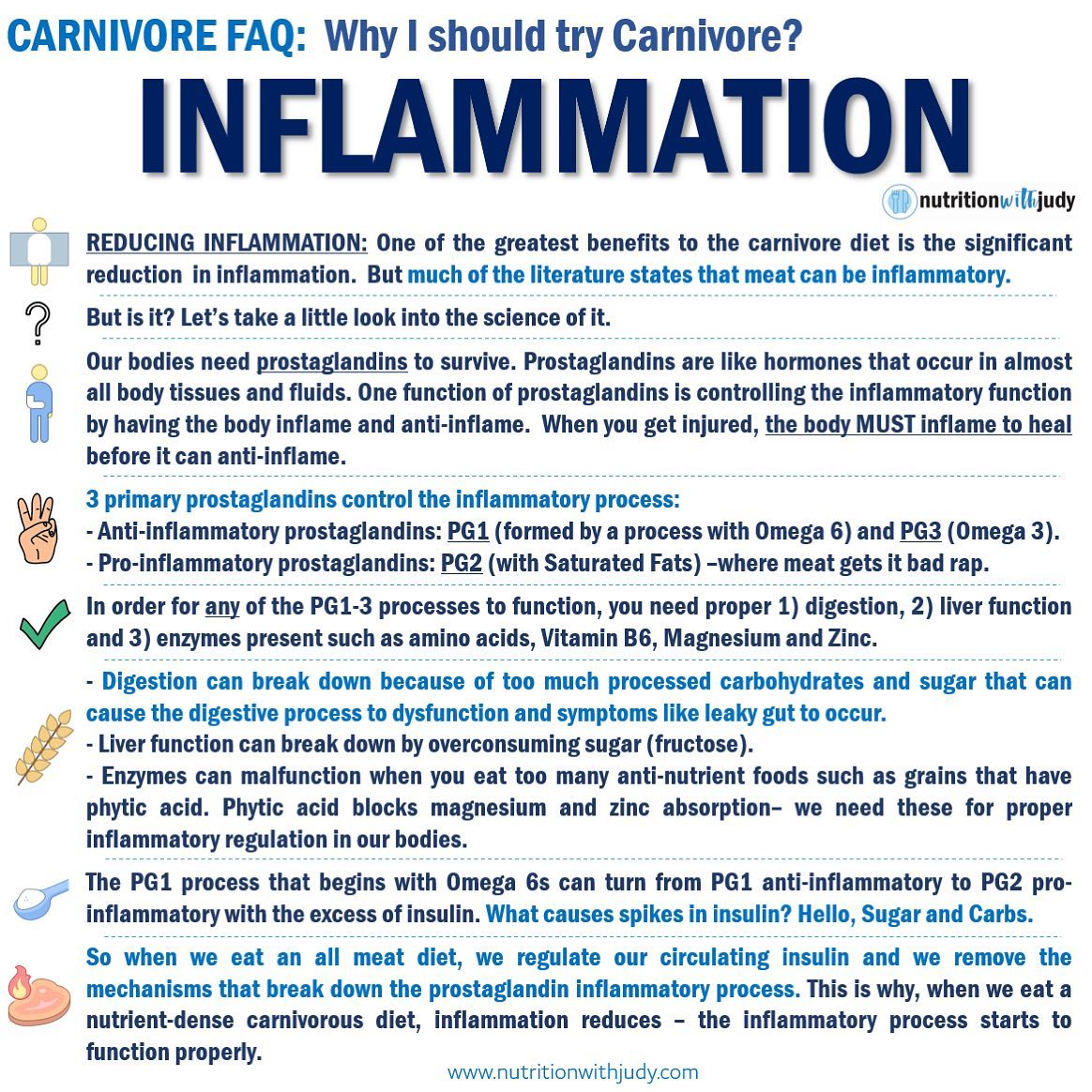

- Reduced Inflammation: The elimination of plant-based foods, which can contain anti-nutrients and inflammatory compounds, can lead to reduced inflammation in the body, benefiting those with autoimmune conditions or joint pain. Carnivore is the most anti-inflammatory diet available.
- Increased Energy and Better Sleep: Many on the carnivore diet experience a surge in energy levels and improved sleep patterns. This could be attributed to the stabilizing effect of the diet on blood sugar and energy levels throughout the day.
- Nutrient Density: Animal products are rich in essential nutrients such as B vitamins, iron, zinc, and high-quality protein. The diet’s emphasis on organ meats, particularly liver, provides a wealth of vitamins and minerals.
- Skin Health: Anecdotal reports suggest improvements in skin conditions such as acne, eczema, and psoriasis, likely due to the diet’s anti-inflammatory properties and elimination of potential trigger foods.
- Hormonal Balance: The carnivore diet supports hormonal health by providing essential fats and cholesterol, which are building blocks for hormones. This aspect is especially beneficial for thyroid and reproductive hormones.
- Appetite Control: High protein intake leads to increased satiety, helping to naturally regulate appetite and reduce cravings, particularly for sugar and processed foods.
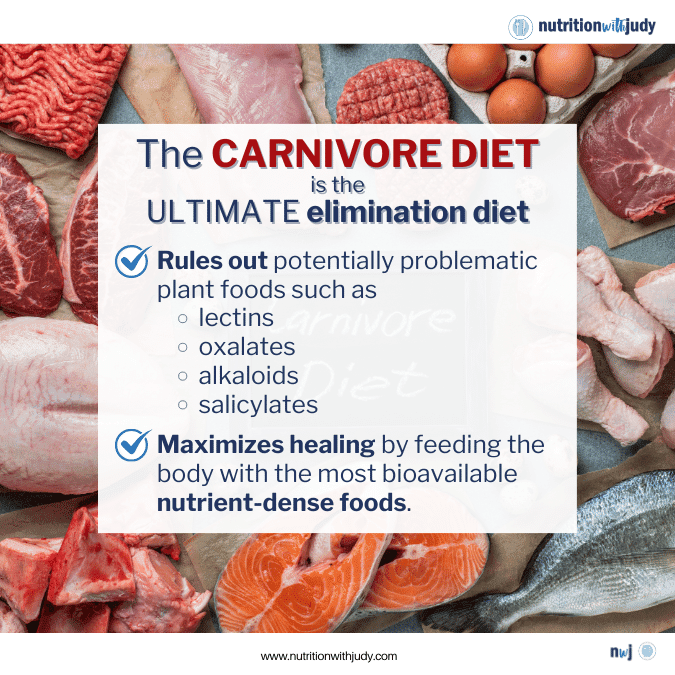

- Food Intolerance and Sensitivity Identification: As an elimination diet, the carnivore diet helps identify food intolerances. By reintroducing foods slowly, individuals can pinpoint specific sensitivities.
- Autoimmune and Allergy Symptom Reduction: The elimination of potential allergens and irritants from plant foods can lead to a reduction in autoimmune and allergy symptoms.
- Improved Dental Health: The absence of sugar and reduced carbohydrate intake can contribute to better dental health, with reports of reduced plaque and improved gum health.
- Support for Blood Sugar and Metabolic Health: The diet’s low carbohydrate nature supports stable blood sugar levels, beneficial for those with diabetes or metabolic syndrome.
While the carnivore diet presents numerous benefits, it’s important to approach it with a personalized perspective, considering individual health needs and wellness goals. It’s always important to speak with your trusted healthcare provider before starting any new diet or supplement protocol.
What Are the Different Variations of the Carnivore Diet?
The carnivore diet, centered on animal-based foods, presents a variety of adaptations to suit different health objectives and personal needs. Each version of this diet has its distinctive characteristics:
- Beef-Only Carnivore Diet: Focusing solely on beef, this diet is recommended for its simplicity and effectiveness, particularly for those with autoimmune or chronic health issues. Initially, it’s a great starting point, but for long-term sustainability, a diverse meat intake is advised for nutritional balance.
- Nose-to-Tail Carnivore Diet: Advocating the consumption of the entire animal, including organ meats, this variation ensures a comprehensive nutrient profile. However, those with certain health conditions should moderate their intake of organs such as liver and kidneys to prevent nutrient excesses, such as vitamin A toxicity.
- Meat-Only Carnivore Diet: This approach includes all muscle meats across the animal kingdom while excluding organ meats, dairy, and eggs. It’s an excellent foundational elimination diet for those who tolerate muscle meat well.
- Zero-Carb Carnivore Diet: Targeting foods with minimal to no carbohydrates, this diet incorporates dairy, eggs, and a variety of meats, primarily focusing on meat and animal fats. Suitable for individuals without autoimmune or significant chronic health issues, it allows for some flexibility with seasonings.
- Carnivore Keto Diet: Merging the ketogenic diet principles with the carnivore approach, this low-carb, high-fat diet includes low-toxicity keto foods such as avocados and coconut oil. It’s ideal for those who are metabolically healthy and have resolved or nearly resolved their chronic health concerns.
- Carnivore-ish Keto Diet: Offering more dietary leeway, this version blends additional ketogenic components while still prioritizing animal-based foods. It includes keto-friendly sweeteners, selected nut products, and other keto varieties, maintaining a meat-centric focus. Recommended for metabolically healthy individuals who have overcome health issues and don’t struggle with food addiction.
- Animal-Based Diet: Expanding beyond the strict carnivore regimen, this diet bases itself on animal products while also including fruits, honey, and raw dairy. In our experience, only metabolically flexible individuals, including elite athletes, typically thrive on this diet.
Each of these carnivore diet variations caters to different health goals and dietary preferences, offering a range of options for individuals seeking health optimization through diet.
What Is the Lion Diet?
The lion diet, a specific variation of the carnivore diet, is designed for individuals seeking a highly focused way of eating. This diet comprises exclusively ruminant meats, salt, and water, making it one of the most stringent forms of the carnivore diet. The lion diet is primarily used as an initial step in elimination protocols, aiming to identify and remove potential dietary irritants and triggers. It’s particularly beneficial for those with autoimmune conditions or significant digestive issues, as it simplifies the diet to a few key components.
The emphasis on ruminant meats, such as beef, lamb, and goat, ensures a nutrient-rich intake while minimizing exposure to compounds that might be problematic in other foods. This approach is not just about what is included — ruminant meat, salt, and water — but also about what is excluded. By removing other types of meats, dairy, eggs, and all plant foods, the lion diet offers a clear, focused path for individuals looking to address specific health challenges through diet. This diet variation is especially recommended for those seeking to support or potentially put into remission autoimmune or chronic health issues through dietary means.
Why Ruminant Meats Only?
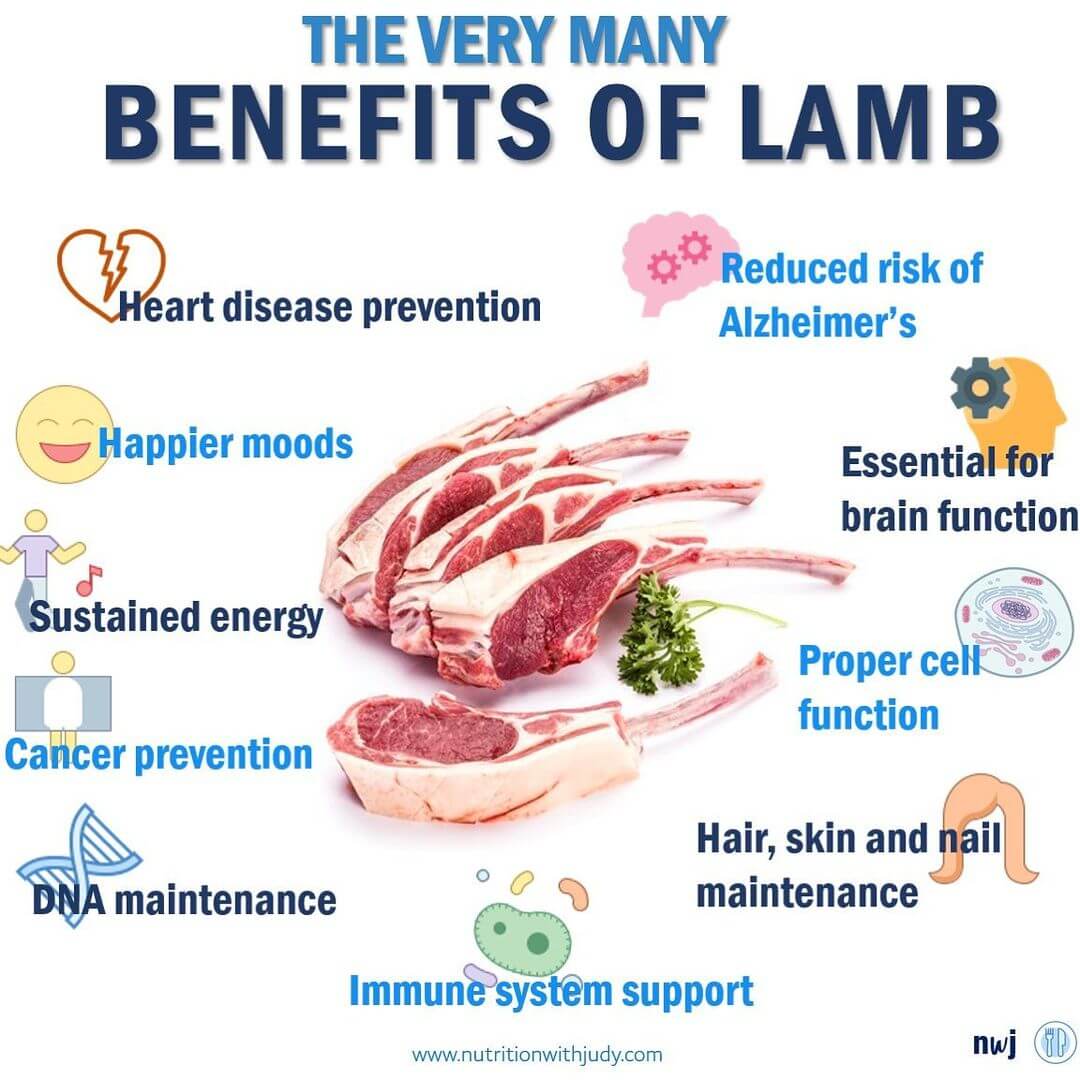

Ruminant meats, which come from animals with a unique digestive system that includes a four-chambered stomach (rumen, reticulum, omasum, and abomasum), are rich in nutrients and have a favorable fatty acid profile. Ruminant animals are able to better digest plants due to their unique digestive system, efficiently extracting nutrients from plant foods that other animals can’t digest.
Monogastric animals, such as poultry and pork, have a single-chambered stomach and are generally less efficient at digesting plant material and extracting nutrients. Ruminants are able to convert grass and other non-edible plant materials into high-quality protein and fats. This offers a better nutrient profile including omega-3 fatty acids, conjugated linoleic acid (CLA), and vitamin E.
These characteristics contribute to their digestibility and nutritional benefits. The lion diet’s focus on ruminant meats leverages these advantages, offering a nutrient-dense food source that minimizes potential irritants or allergens found in more varied diets, which might explain its general tolerability.
Who Should Try the Lion Diet?
The lion diet, ranking as the second most restrictive variant of the carnivore diet, is an ideal choice for individuals grappling with deeper health concerns and serves as an excellent foundation for an elimination diet. This diet is specifically tailored for those looking to support or potentially put into remission serious autoimmune conditions, chronic health issues, or severe gut-related problems. The lion diet’s streamlined approach of including only ruminant meats, salt, and water, makes it a powerful tool for identifying and eliminating dietary triggers.
By restricting the diet to these few components, individuals can closely monitor and understand how their bodies react to specific foods, making it easier to identify intolerances and sensitivities. The lion diet is particularly beneficial for those who have tried other dietary interventions without success, as it provides a clear, unambiguous path to understanding the impact of food on their health.
Moreover, the simplicity of the lion diet aids in digestive health and can lead to improvements in overall well-being. It’s an excellent starting point for anyone looking to embark on a journey towards resolving complex health issues through dietary means, offering a strict but potentially effective approach to wellness.
The Lion Diet Meal Plan
Creating a meal plan for the lion diet, which emphasizes a macro distribution of approximately 70% fat and 30% protein, involves focusing on ruminant meats and salt. Here’s a sample one-week meal plan with two meals per day, totaling 14 meals. Most people find themselves eating two meals a day on this diet, however, others may eat one meal or three meals a day. Adjust accordingly to make this diet sustainable for you.
Day 1:
Meal 1: Ribeye steak cooked in beef tallow
Meal 2: Slow-cooked lamb shoulder
Day 2:
Meal 1: Ground beef patties
Meal 2: Pan-seared bison steak
Day 3:
Meal 1: Beef brisket slow-cooked
Meal 2: Grilled goat chops
Day 4:
Meal 1: Bone marrow with NY strip steak
Meal 2: Roasted venison
Day 5:
Meal 1: Beef suet with lean beef cuts
Meal 2: Lamb ribs slow-roasted
Day 6:
Meal 1: Slow-cooked oxtail
Meal 2: Ribeye steak cooked in beef tallow
Day 7:
Meal 1: Ground lamb formed into patties
Meal 2: Beef sirloin with bone marrow
This meal plan is designed to provide a balance of fat and protein while adhering to the lion diet’s guidelines of consuming only ruminant meats and salt. The inclusion of various cuts ensures a diverse nutrient profile and maintains interest in the diet. Remember, it’s essential to adjust portion sizes and fat content to meet individual nutritional needs and to achieve the desired macro balance. For more information on carnivore diet macros, learn more here.
Transitioning From the Lion Diet to Other Carnivore Diets
Transitioning from the lion diet to other carnivore diet variations involves a strategic and careful process, especially for those who have been following this highly restrictive diet. The lion diet serves as a strict elimination diet, making the reintroduction of new foods a critical step. According to our book Carnivore Cure, which provides detailed guidance on this transition, the process should be gradual and methodical.
When transitioning, it’s essential to reintroduce one new food at a time, observing how your body reacts to each addition. This methodical approach helps in identifying any food intolerances or sensitivities that may have been unnoticed before. Using a Food and Mood Journal is a great way to track how you do with food reintroductions. It’s advisable to start with less reactive foods, gradually moving to more diverse meat options such as poultry, pork, and seafood. The inclusion of eggs and dairy should be considered later in the transition process, as they can be more reactive for some individuals.
A step-by-step reintroduction allows for careful monitoring of any changes in symptoms, digestion, energy levels, or overall well-being. This approach ensures that the benefits gained from the lion diet are not compromised and that the transition to a more varied carnivore diet is beneficial and sustainable.
Throughout this process, it’s crucial to listen to your body’s signals and make adjustments as needed. The transition period can vary from person to person, depending on individual health conditions and responses to dietary changes. Consulting with a healthcare professional experienced in dietary transitions can provide additional support and guidance.
Closing Thoughts On the Lion Diet
The lion diet, a specific variation of the carnivore diet, is designed for individuals with deep health concerns, particularly those with autoimmune conditions or digestive issues. As the second most restrictive form of the carnivore diet, it consists exclusively of ruminant meats, salt, and water. This diet serves as an effective elimination protocol, simplifying the diet to easily identify food sensitivities and intolerances.
Transitioning from the lion diet to other carnivore diet variations should be gradual and methodical. Carnivore Cure offers step-by-step instructions for reintroducing new foods, advocating for a one-food-at-a-time approach to monitor the body’s reactions. This careful reintroduction is crucial in maintaining the benefits gained from the Lion Diet and ensuring a sustainable dietary change.
A sample one-week meal plan for the lion diet includes a variety of ruminant meats, such as beef, lamb, bison, goat, and venison, cooked with minimal ingredients, emphasizing a macro distribution of about 70% fat and 30% protein. This plan is tailored to uphold the diet’s guidelines while ensuring nutritional adequacy and variety.
Overall, the lion diet is a focused, restrictive approach, beneficial for addressing specific health challenges through dietary means. It requires careful consideration and adaptation to individual health needs and goals.
Work With Our Trusted Carnivore Diet Functional Nutritional Therapy Practitioners
The Nutrition with Judy practice is honored to be a trusted carnivore diet practitioner support serving clients from around the globe. We’re passionate about helping our clients achieve root-cause healing in order to lead the best quality of life possible that’s nearly symptom-free. Our team is dedicated to educating our community about the incredible benefits of the carnivore diet. We welcome you to explore our free resources and are always available to support you through personalized protocols. Our Symptom Burden Assessment (SBA) is the perfect starting point for discovering your root cause and is required to work with our team— you can learn more in-depth about this powerful tool here.
Start your root-cause healing journey today and contact us any time with any questions or concerns.
DISCLAIMER: This content is for educational purposes only. While we are board-certified in holistic nutrition and are nutritional therapy practitioners, we are not providing medical advice. Whenever you start a new diet or protocol, always consult with your trusted practitioner first.






kd
February 17, 2024 at 8:34 pmI have found that I cannot have beef because it is aged. The aging process is a histamine producer. Wild game is not aged, so I am ok with lamb, bison, etc. Some ground beef is minimally aged and can be ok in small amounts. So for those still having trouble on carnivore, this may be the issue.